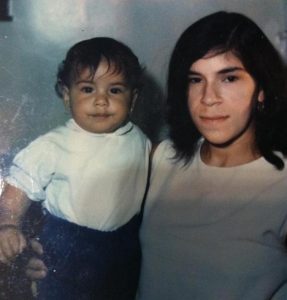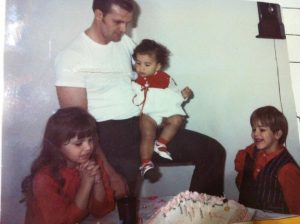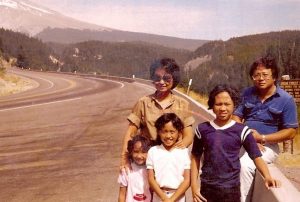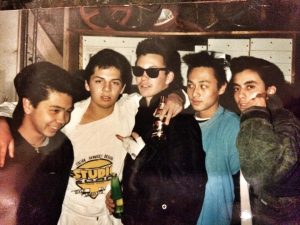“You know, for a mom with no means, she’s pretty awesome.” – My Mother
Her Background: Raised in South Central, historically one of the most underprivileged communities in Southern California, my mother’s childhood consisted of three constants, family, chaos and uphill battles. Before my mother turned eleven, she was the victim of a  drive-by shooting and held hostage in her own home. At twelve, her father left to find work in New York, as the garment factories he’d worked in closed down, but he never came back for more than a weekend following. At fourteen, my mother worked three jobs to help with bills her single mother could not afford to pay. The only reason my mother even knew about college is because her friend invited her to accompany her on a college tour of the nearest Cal State. She had only met this friend because she was bussed to a primarily white, middle-income school as part of the desegregation bussing implemented in the eighties. My mother applied to only Cal State Fullerton and, without the knowledge of financial aid, she continued working three jobs to pay her way through college and continue to help with bills at home.
drive-by shooting and held hostage in her own home. At twelve, her father left to find work in New York, as the garment factories he’d worked in closed down, but he never came back for more than a weekend following. At fourteen, my mother worked three jobs to help with bills her single mother could not afford to pay. The only reason my mother even knew about college is because her friend invited her to accompany her on a college tour of the nearest Cal State. She had only met this friend because she was bussed to a primarily white, middle-income school as part of the desegregation bussing implemented in the eighties. My mother applied to only Cal State Fullerton and, without the knowledge of financial aid, she continued working three jobs to pay her way through college and continue to help with bills at home.
Influence: Almost every decision in my mother’s life was accompanied with severe consequences– much more severe than anything a child should have to deal with. So, in response, she had to grow up very quickly and her mother had to parent very carefully. She values family because those are the only people you have in the end and the only people you can always trust. She values independence and responsibility because if you couldn’t take care of yourself and make the right decisions when she was young, there  could be fatal consequences. She values education because it is the one thing that got her out of her condemning city. She values a strong emotional bond with her children because her mother needed that in order to ensure their survival and success. She values stability and play because they were luxuries she did not have a lot of growing up. Her mother parented with guidelines, outlining the path to success, as a lack of resources limited her ability to parent with guardrails, direct intervention to ensure success. Since my mother does have the means necessary, she has taken on a guardrail approach to helicopter parenting. She echoes the values accumulated in her upbringing in her own parenting style, adjusting on the basis of our starkly different environment.
could be fatal consequences. She values education because it is the one thing that got her out of her condemning city. She values a strong emotional bond with her children because her mother needed that in order to ensure their survival and success. She values stability and play because they were luxuries she did not have a lot of growing up. Her mother parented with guidelines, outlining the path to success, as a lack of resources limited her ability to parent with guardrails, direct intervention to ensure success. Since my mother does have the means necessary, she has taken on a guardrail approach to helicopter parenting. She echoes the values accumulated in her upbringing in her own parenting style, adjusting on the basis of our starkly different environment.
“I’m a first generation family member meaning that my parents came here from the Philippines. They weren’t accustomed to or aware of American culture and how kids are raised or their social upbringing.” – My Father
His Background: Raised in San Dimas, a primarily white, suburban town in California, my father’s childhood emphasized two things: race and money. My paternal grandfather emigrated from the Philippines to the United States to get an advanced degree in
engineering from University of Southern California, as paid for and arranged by a US based company. My paternal grandparents then got married and applied for citizenship in the US where my grandfather went on to engineer medical devices and become a high ranking executive and my grandmother pursued a career in accounting. Being a first-generation American, my father’s parents continued to implement culturally Filipino values and traditions throughout his upbringing. In an overwhelmingly white town, my father and  his family accumulated a very close-knit community of Asian-American friends. On the same note, other minorities formed close groups and frequently interacted with each other. My father also was raised in three socioeconomic statuses: low-income, middle-income and high-income. While he was lower-income, he lived in an apartment and remembers his parents working long hours. While he was middle-income, they went on more family outings and his grandmother continued being the primary caretaker as my grandparents still needed both incomes. When he was high-income, the family moved into an huge home in the nicest part of town, my father received a bright, red convertible upon entering his junior year and frequently threw high school and family parties in their home.
his family accumulated a very close-knit community of Asian-American friends. On the same note, other minorities formed close groups and frequently interacted with each other. My father also was raised in three socioeconomic statuses: low-income, middle-income and high-income. While he was lower-income, he lived in an apartment and remembers his parents working long hours. While he was middle-income, they went on more family outings and his grandmother continued being the primary caretaker as my grandparents still needed both incomes. When he was high-income, the family moved into an huge home in the nicest part of town, my father received a bright, red convertible upon entering his junior year and frequently threw high school and family parties in their home.
Influence: Since race was such a defining characteristic, my father values tradition and culture, which explains his interest in taking my brother and I to museums, exploring new places  and new music. Since minorities identified with one another on the basis of being different than the vast majority, my father values family and friends because sometimes those are the only people who understand your history and your present. He values a strong emotional bond with his children because his mother needed that to gain insight into how children interacted and what was important in a culture she was not as familiar with. In response to watching his family rise in status, my father values hard work and diligence. He values celebrating the good and learning from the bad, because “if you do good work, you can play and if you don’t do good work, you have to stay in and work a little harder.” He values grit and intelligence because that’s what propelled them towards prosperity.
and new music. Since minorities identified with one another on the basis of being different than the vast majority, my father values family and friends because sometimes those are the only people who understand your history and your present. He values a strong emotional bond with his children because his mother needed that to gain insight into how children interacted and what was important in a culture she was not as familiar with. In response to watching his family rise in status, my father values hard work and diligence. He values celebrating the good and learning from the bad, because “if you do good work, you can play and if you don’t do good work, you have to stay in and work a little harder.” He values grit and intelligence because that’s what propelled them towards prosperity.
My parents have woven these values into my childhood like the stitching on a quilt: not obstructing the individual integrity of the garment but simultaneously holding it all together. These values are sacred and our history is the reason for our present. Because:
“You can never forget where you came from, because that’s the reason you’re going where you’re going. You can never forget where you came from, because at the end of the day, that’s all you are.” – My Mother
